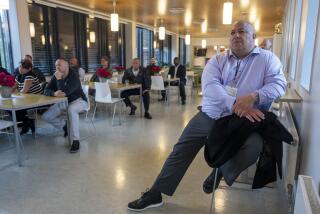Swedish Student Sees One Difference in U.S.--Mugging
- Share via
As Henrik Unell sees it, life for a teen-ager in the United States is a lot like it is in Sweden--except for muggings.
Unell is a 17-year-old exchange student from Baras, Sweden, who is spending the school year with the Richard and Doris Mastin family in Torrance.
Shortly after arriving in this country in September, Henrik was strolling down a street in Harbor City when two men pushed him up against a wall and robbed him of his watch and $40 in cash. “I was really scared for a while,” he said. “But it’s in the past now.”
Did the experience make him critical of the American society? “Oh, no,” he said. “I know too much about your country to think it’s bad.”
For a moment, Henrik dropped his American teen-ager disguise, revealing a foreigner’s unabashed, wide-eyed admiration for the United States. “It’s a very special country,” he said. “Everything is so . . . big. You have so much here of everything, and the people are more open. It’s really super.”
But otherwise, Henrik feels and talks pretty much like an American teen-ager.
To begin with, his slangy, American speech patterns tend to disguise the foreign influences in his upbringing. He talks like American youths, he explained, because in Sweden everybody is taught English from an early age--and then there are all those imported U.S. television programs, movies and books that make American life styles familiar the world over.
Does everybody in Sweden speak such perfect English? Yeah, Henrik said, all but the ancient people (those over 40 to Henrik) who received their schooling before the government instituted universal English language courses in its educational system.
Questions about Henrik’s personal interests and likes--parties, girls, sports (especially skiing), playing on the beach, fast foods, television (especially old Clint Eastwood movies)--also failed to uncover any significant cultural differences.
He is thinking about being an accountant someday, or maybe he will get into the textile business--the major industry in his hometown--but, again like many middle-class American youths, the day seems far off when he must trade in his carefree time of life for the heavy responsibilities of an adult.
He hopes to return to this country in a year or so and work as a ski instructor at Mammoth Lakes. That way he will get to ski a lot himself and skiing, perhaps even more than girls and partying, is his greatest passion. He already has talked with people at Mammoth and received tentative job offers.
The Mastins and their 17-year-old daughter, Wendy, also found it difficult to put their fingers on specific cultural differences. “He’s very smart in school,” observed Doris Mastin, a teacher. But then, it was noted, all students in the American Scandinavian Student Exchange program must maintain good grades.
“Well,” Wendy ventured, after a thoughtful pause and several sidelong glances at Henrik, “his hair is too long.” Henrik promised to have his hair cut soon to conform with local customs.
Pressed for a more sweeping generalization, Wendy said that, according to Henrik, young people in Sweden get to stay out until all hours of the night. But her father, she said, insists on a 12:30 a.m. curfew. “You know that’s true, Dad,” she said with a reproachful look at the head of the family.
Henrik cast around for cultural differences and came up with more similarities. “Girls are the same everywhere . . . they want to date and stuff” instead of just partying; “parents are always the same” no matter what country, and in Sweden, like every place else, “everybody complains about taxes.”
At last, he thought of the differences. In Sweden, he said, very few young people use drugs and the streets of his hometown are safe to walk at any hour of the day or night. And yet, he concluded, after all his travels--he has visited Canada and most of the countries of Europe--he will return to Sweden to settle down. “That’s my real home,” he said.
The American Scandinavian program is looking for about a dozen South Bay families to host next year’s visiting students from Scandinavian and other northern European countries. Missy Bosch, the program’s area representative, said it also has openings for American students who want to spend a school year or a six-week summer session in a European home. She can be reached through the ASSE office, 228 N. Coast Highway, Laguna Beach 92651.
More to Read
Sign up for Essential California
The most important California stories and recommendations in your inbox every morning.
You may occasionally receive promotional content from the Los Angeles Times.













